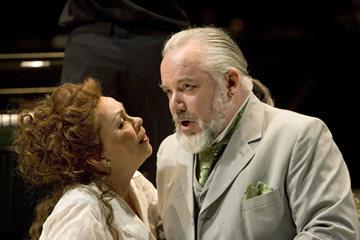|
Editor: Marc Bridle
Webmaster: Len Mullenger
|
Seen and Heard Opera
Review
'Bluebeard's castle, a myth , a legend. When was it born? Where did it come from? Where did it happen? Or did it never happen? What does it mean, Ladies and Gentlemen?'
Good questions all of them, especially when set in a semi-staged version of Bartók's only opera, presented without scenery or the clutter of excessive imagery. What is this story really about?
It's a horrific tale of course, but seeing it done with particularly naturalistic acting from John Tomlinson and Sally Burgess, it occurred to me that Jungian psychology can have something relevant to offer. Just as the relationship between Heathcliffe and Catherine in Wuthering Heights can be read as an irreconcilable clash between Jung's archetypal Anima (his) and the Animus (hers), so might Judith's relationship with Bluebeard.
' When a man is gripped by the Anima,' Jung once said, 'he is all but done for.... he's finished,' and when a woman is seized by her Animus, her position is much the same. In this production, Bluebeard does indeed seem to represent nothing more to Judith than a personification of her own unexpressed incompleteness (the Animus's masculine characteristics of anger, violence, power, irresponsibility and spontaneity) and she and the other wives mean only unreachable beauty, love and belonging to Bluebeard. Both characters then, are well and truly done for, imprisoned for life, however long it lasts: there is no chance at all of reconciling their deepest psychic drives with anything or anyone real.
It's certainly strong stuff, whatever the opera's true meaning, and it's extremely ably sung in this production by both of the principals. John Tomlinson's Bluebeard is superbly menacing and authoritative, his voice full of subtlety thoughout its whole compass and with perfectly harnessed, effortless power. Sally Burgess's Judith is the perfect foil too; equally strong both vocally and dramatically she sings so well in this production that the emotional 'chemistry' generated by the partnership is tangibly 'alive' whatever the mood of the moment.
Richard Farnes' conducting reveals a good deal of the beauty and all of the power within Bartok's score, and if I have to carp at all, it is to say that a more modest approach to fortissimi would have been welcome now and again. On a couple of occasions, the balance between orchestra and voices really swamped the singers (and that's no mean feat when one of them is Tomlinson), and at the opening of the fifth door, Mr. Farnes' enthusiasm for the Symphony Hall organ and the Opera North orchestra's brass section made the sound positively ear-splitting. Too much by half and then some, at least for me.
Orchestral balance (and it could well have had something to do with Symphony Hall itself) was a similar problem in the evening's filler pieces. The overture to Die Meistersinger seemed relentlessly loud throughout and in Strauss's Vier Letzte Lieder, Amanda Roocroft was hard-put to make herself heard sometimes, especially in 'Frühling.' A very great pity this, since Ms Roocroft can obviously sing Strauss very beautifully and with great sensitivity in the right circumstances.
When the applause for Bluebeard had finally died down, Richard Farnes announced John Tomlinson's knighthood for the benefit of those who had not heard Saturday's news. Sir John then took the opportunity to make a short speech. He said that he did not believe that opera was either exclusive or elitist (as some like to think) and while opera was clearly a 'minority' interest, the numbers of people who made up that minority were very substantial indeed. He was proud to be part of itl, he said, and took pleasure from giving pleasure to so many people. Well said, Sir John: let's hope more people in the establishment speak up for opera in the UK so clearly. It needs more affirmations of this kind, especially when it's great opera performed as well as this one was.
Back to the Top Back to the Index Page |
| ||
|
||||



